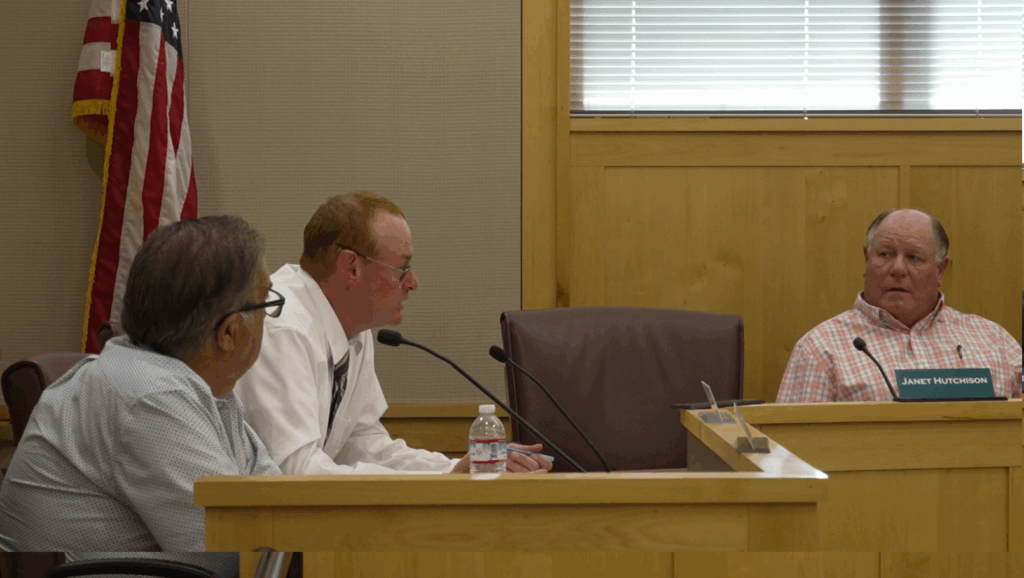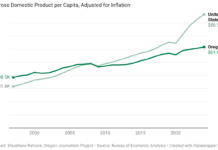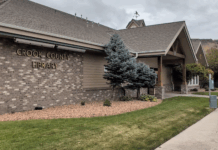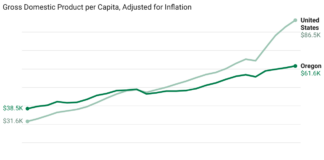
Prineville, Ore. – The Prineville City Council has approved a resolution providing for remote video attendance at its public meetings, but questions remain about whether residents will be permitted to testify remotely.
During the council’s August 12th meeting, the City Attorney, Jered Reid, claimed that Oregon law only requires public bodies to accept remote testimony during public hearings, not during public meetings generally.
ORS 192.670(3) provides that “if the governing body allows in-person testimony, it shall also allow testimony by telephone, video, or other electronic communication in real time.” The law specifically outlines that it applies to all “public meetings”, except executive sessions.
“From a public hearing standpoint, you will be required to allow people to testify by meeting through the video services. [For] visitors’ appearance and requests [the public comment period], you are under no legal requirement, and this could not make that requirement; that would be up to the chair,” said Reid.
Reid declined to elaborate on the novel legal argument challenging the scope of ORS 192.670, but did go on to say the City did not have to allow any testimony at all.
The issue facing the City and its current position, outlined initially by councilors in July, is the desire to require the public to attend in person to have the opportunity to comment. Our reporting on the council’s position quickly resulted in extensive public backlash. The controversy only grew further after the Prineville Review discovered the City also omitted any mention of the councilors’ controversial comments in its meeting minutes, which were approved August 12th.
During ordinary public meetings, governing bodies are not obligated to provide any comment period at all. As the Oregon Attorney General has explained, the state’s public meetings law is not a “participation law.” This means that while a governing body could eliminate testimony altogether, it cannot selectively prohibit remote testimony or discriminate against viewpoints without risking violations of constitutional protections.
According to the League of Oregon Cities (LOC), public bodies are required to hold public hearings in certain circumstances, such as when enacting ordinances or making changes to the law, and in those hearings, testimony must be accepted.
“In many cases, public participation might be required by another statute, a state regulation, or by a local charter or ordinance. For example, a city ordinance may require the city council to hear public comment when the council considers whether to condemn private property for public use. Similarly, state law requires cities to provide an opportunity for public testimony during the annual budgeting process.”
The Oregon legislature passed HB 2560, which took effect in January of 2022. The change stemmed from challenges during the COVID‑19 pandemic, when remote meetings became a necessity. Oregon Lawmakers recognized that allowing virtual participation not only served public health but also improved accessibility—especially in a geographically large state like Oregon.
The statute was further supported by new administrative rules created by the Oregon Government Ethics Commission last year. OAR 199-050-0050(5) says: “When public testimony is permitted, the governing body shall… Allow oral testimony by telephone, video, or other electronic or virtual means if in-person oral testimony is allowed.”
Reid’s position is also at odds with guidance from the LOC, of which the City is a member.
“[The] Oregon Legislature passed House Bill 2560 in the 2021 session, requiring those remote options to continue. This amendment became effective January 1, 2022, requiring government agencies, whenever possible, to allow the public to remotely attend public meetings—through telephone, video or other electronic means—as well as give the public the ability to testify remotely,” according to the League of Oregon Cities Municipal Handbook, Public Meetings Law.
The Council did outline that it would consider allowing remote testimony only as part of efforts to comply with federal law under the Americans with Disabilities Act (ADA).
Multiple council members shared concerns that allowing remote public comment would also lead the meetings to drag out.
“Council was a little bit undecided on the public input being allowed via streaming… [We] really haven’t gotten a lot of public input since we’re getting more of that now we’re going to open it up to online,” Councilor Shane Howard remarked. “You know that part kind of makes me think the meetings are going to drag out.”
Councilor Scott Smith, who made the motion to adopt the proposed resolution, continued to express his position against allowing remote testimony.
“I think we all, I know we all, we all want to do the video. It’s just opening it up for just anybody to get up and rattle, and we’ve got lives too, and we don’t want to be here until 11 o’clock at night and all that,” Smith said.
While the resolution affirms remote attendance, it makes no mention of the council majority’s position that public comment through remote testimony should be barred. Mayor Jason Beebe, who introduced the measure as part of an effort to improve public transparency, and Councilor Marv Sumner both told the Prineville Review they did not oppose allowing remote testimony.
“I believe in video recording, and I agree with people being able to comment back during the meeting. You want to take me into more detail and public hearings, I have nothing to say about that,” said Sumner. “Personal opinion, I don’t see any issue,” Sumner said when asked to clarify if the public should be able to provide remote testimony during public comment.
Sumner also explained that he attends other public meetings in the community and recognized that the City has been behind other public bodies in facilitating public meeting access.
“Everybody’s learning about Oregon ethics laws. And it takes a little time for that to happen. It takes time for that type of thing to get in place. I attend other meetings that are a little bit ahead of us, but we’re still we are meeting the law requirements. I have been right. I like the use of the video, and I see no fear. So that’s just my opinion,” said Sumner.
Nancy Lashley, a local proponent who also supported the move for video access, shared her thoughts about the council’s position, while also praising Mayor Beebe for his efforts to bring forth the initiative for requiring video of the City’s meetings.
“I really appreciate our mayor, because he has really been supportive, and he’s a very good communicator. If you email him, he’ll email you back if you have questions, and I really appreciate that,” said Lashley. “He wants the people to be engaged. He said during COVID, they had the video on, and a lot of people were involved.”
Lashley was more pointed in remarks towards the rest of the council, specifically rebuking Councilor Smith for comments she felt were disrespectful.
“I just want them to be a little more respectful to the community, because some of the comments at the last meeting and even this meeting, there were, you know, when the one councilor said, ‘Oh, I don’t want people to rattle on’,” Lashley said. “And it’s like, excuse me, these are people that want to make comments, you’re calling that rattling?”
Smith was repeatedly offered the opportunity to comment, but repeatedly declined immediately following the meeting. Councilors Brummer and Howard also refused to provide comment. Howard stated our earlier reporting on the councilors’ statements opposing remote testimony was misleading.
We spoke with Pam Tano, who is a local resident who supported Mayor Beebe’s call for adding video access to meetings who explained her delight at the passing of the resolution.
“It’s an issue that is close to my heart. I believe in transparency and accountability, and we as the people have to hold our elected officials and staff accountable for the money they spend,” Tano told the Prineville Review. “I was glad that they cleared it up a little bit, because maybe I was under the impression they weren’t in so much support of the video. They do seem to be in support of video in the meetings, which I’m very happy for there were some other complications with the testimony, and I believe that will have to come out in the details, so to speak.”
Tano also noted that transparency has become a hot-button issue for the public ahead of upcoming elections, particularly in the wake of proposals for biomass, solar, and other major projects in Crook County. “Transparency is going to become a critical issue in re-election, and it’s critical for our town. It’ll cleanse a lot of the distrust, because we’ve lost some trust because of the lack of transparency,” Tano said.
City Manager Steve Forrester also continues to maintain an effective blacklist against the Prineville Review and declined again to comment following the August 12th meeting.
(Editor's Note: Following the publication of this story, Forrester ended his refusal to speak with the Prineville Review, answering questions on an unrelated story following an August 26th council meeting. We thank Mr. Forrester for his efforts.)
Tonight’s (Aug 26th) meeting will mark the first time the council has provided video attendance since adopting the resolution. It is yet to be seen if the city council will continue to allow public comment to be provided remotely, or if it will proceed with its implied prohibition in an effort to test or challenge well-established Oregon law.
The move highlights the city’s step toward increased access, but by passing the measure without clarifying testimony rights, the council has left unresolved whether members of the public will truly be granted equal opportunity to participate in its proceedings. Tonight’s meeting may provide answers for the community.
Tonight’s (Aug. 26th) meeting will take place at the City Hall at 6 pm. An agenda for the meeting, including remote video access via Zoom, can be found here.
Mr. Alderman is an investigative journalist specializing in government transparency, non-profit accountability, consumer protection, and is a subject matter expert on Oregon’s public records and meetings laws. As a former U.S. Army Military Police Officer, he brings a disciplined investigative approach to his reporting that has frequently exposed ethics violations, financial mismanagement, and transparency failures by public officials and agencies.





